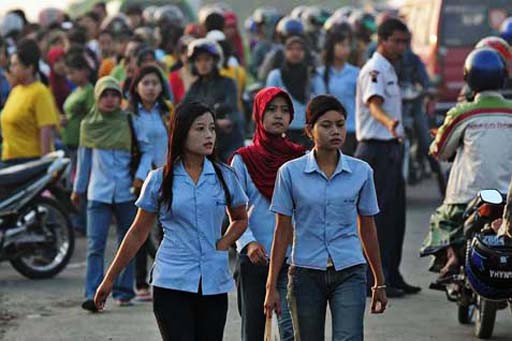Popular Reads
Top Results
Can't find what you're looking for?
View all search resultsPopular Reads
Top Results
Can't find what you're looking for?
View all search resultsText messages best way to ensure preemployment card program reaches targeted recipients: Experts
As of Monday, 2.9 million people had applied for the preemployment card program, which offers access to fours month of training for people affected by the COVID-19 outbreak.
Change text size
Gift Premium Articles
to Anyone
The government has introduced a series of social assistance programs to help people affected by the social restrictions implemented to halt the spread of COVID-19 from affected areas such as Jakarta to other regions of the country.
One of the programs, the preemployment card program, provides access to four months of training for people who have lost their jobs due to COVID-19 outbreak, which has crippled the country’s economy.
To make sure the benefits reach the targeted recipients, the government should inform the public via text message, said researchers.
As of Monday, 2.9 million people had applied via the program’s website, prakerja.go.id. The government will disburse the assistance, totaling Rp 3.5 million (US$226.04) in stages, starting with Rp 1 million to take online courses, Rp 2.4 million in post-training benefits and Rp 150,000 as an incentive to take an employment survey.
After increasing the program’s budget twofold to Rp 20 trillion, the government plans to cover 5.6 million eligible recipients, with a particular focus on laid-off and furloughed workers, as well as owners of small and medium businesses affected by the outbreak.
With the majority of the promotion and registration for the program taking place online, a large portion of intended recipients may not be able to access the assistance, as only 64 percent of the population has internet access, according to a 2018 study by the Indonesian Internet Providers Association (APJII).
The government, therefore, should partner with cellular service providers to distribute information about the program via text message, said SMERU Research Institute researcher Luhur Bima. Text messages “are more likely to reach the public at large,” especially “people who are potential recipients.”
“We need to acknowledge there are people with relatively low levels of digital literacy and people who lack access to popular media platforms, including social media,” Bima told The Jakarta Post via text message on Monday. “The government could also work with community units and neighborhood units to reach people who lack access to modern communication tools.”
Informing people via text message was also important at this point because many workers and micro, small and medium enterprise entrepreneurs affected by the outbreak had left the capital for their hometowns, a tradition known as mudik (exodus), said another SMERU Research Institute researcher, Palmira Permata Bachtiar.
“Without a good communication strategy, people may be excluded from the preemployment card program,” Palmira told the Post via text message Tuesday. “Text messages should be used because they are more likely to reach people who live in villages.”
Thousands of people left the capital before the government imposed large-scale social restrictions earlier this month to slow the spread of COVID-19. Central Java, for example, recorded 6,724 arrivals in three cities by the end of March.
As of Tuesday, 4,839 people across the country had contracted the fast-spreading COVID-19. Of them, 459 had died of the disease and 426 had recovered.
A number of companies have shut their factories to comply with the government's orders to contain the contagious disease. As a result, nearly 2.7 million people had reported that their jobs had been impacted as of Monday, according to data from the Manpower Ministry and the Workers Social Security Agency (BPJS Ketenagakerjaan), with more than half furloughed or placed on paid or unpaid leave.
The preemployment card program offers access to both online and in-person courses. However, only online courses are available at present, in line with the government’s physical distancing orders, according to the program’s director of communication, partnerships and ecosystem development, Panji Winanteya Ruky.
The program offers 900 courses, including English for tour guides, accounting, information technology and business management, in partnership with eight companies, including online learning platform Skill Academy and e-commerce companies Tokopedia and Bukalapak.
“It is not ideal during this COVID-19 pandemic because many in-person courses cannot be held,” Panji told the Post via text message on Tuesday. “The Home Ministry has asked regional administrations to provide facilities for people to access online courses, while complying with the COVID-19 safety protocols.”
After completing a course, eligible recipients — those aged 18 years or above who are currently not attending university, particularly those who have yet to receive any social assistance — will receive benefits via bank transfers or e-wallet platforms GoPay and LinkAja.










